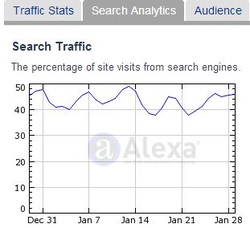
Of the many ranking systems used to evaluate websites, Alexa, an analytics service owned by Amazon, is one of the most popular. In a nutshell, Alexa measures traffic to a website – the more visitors, the higher the rank. (Low numbers indicate a high rank. Number 1, the highest position, is occupied by Google.) Alexa provides data on 30 million websites, and has over 7 million visitors monthly.
How does Alexa gather website information?
Big Brother is not actually watching you. In order to retrieve information on how many people visit a site, Alexa provides a free toolbar. (See below.) Once installed, this toolbar monitors which websites a person visits. That part is fairly straighforward, but not altogther useful. Mere numbers don't give businesses enough information to tailor their marketing efforts, which is why Alexa also gathers data on demographics, such as age and income groups, sex, and region. For marketing purposes, knowing who visits your website, and from where, is crucial information.
There are some drawbacks to the system. The toolbar is most often used by techies, people who specialize in SEO and other analytics. It shouldn't come as much of a surprise that tech sites have higher ranking than sites that appeal to people who are more concerned with other types of content – such as literary work. Alexa can't measure the browsing habits of people who don't install the toolbar, which may account for why regional traffic in India is often much higher than the U.S. (India is a major source of website and internet technology.)
How can you make Alexa work for you?
If you have just launched a website, don't even think of trying to improve your Alexa ranking. No matter what you do, your rank is going to be abysmally low (your number will be in the multi-millions), and there is no amount of backlinking, blogging, or giveaways that will get you under 100,000, which is the cut-off point for viewing demographic statistics.
Instead of trying to improve your own ranking, you can use Alexa much in the same way other businesses do. (If you have published a book, in any form, you are a business.) Let's say you would like to increase your visibility as a writer (i.e. build your platform). If your blog isn't getting a lot of traffic, it makes sense to either guest blog or write articles for sites that get significantly more visitors than yours. The easiest way to research the most-trafficked sites for posting guest blogs and articles is by looking at their Alexa ranking. You can get a quick view by installing the toolbar, or you can go the website for more specific data.
I have used Alexa ranking to help decide where I guest blog. Whenever someone publishes an article on the top sites for books, articles or blogs on my topic, I immediately look up their Alexa ranking. If the rank is high (i.e. the number is under 100,000), I check to see who visits the site. If the site appeals to my demographic, I submit a guest blog or article. Chances are, the article will be accepted, because I'm submitting an article geared towards the needs of their market.
Writing requires time and effort. Make sure you get the most out of your labor by placing your work where it will work for you.
Resources:
Alexa
http://www.alexa.com/
This is where you go to search Alexa rankings. To install the toolbar, click on the tab "Toolbar." Installation takes a few seconds.
What is Alexa Ranking and Is It Worth Striving For?
http://www.demondemon.com/2012/06/05/what-is-alexa-rank-and-is-it-worth-striving-for/
This is a nice little article that spells out what Alexa is and does … and doesn't.
 RSS Feed
RSS Feed